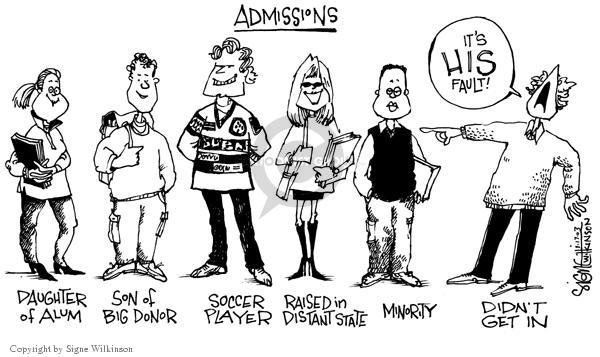IIRC, the lawsuit against the University of Michigan law school made assigning numerical scores to demographics illegal. So AA can't just be part of an algorithm.
Problem is that there's no regular auditing of the admissions process by the state, and schools will often cite confidentiality when asked for data. Sometimes they get audited, but it is hard to enforce, and thus generally ignored. (I think there are also some lawyer-y nuances about what constitutes an algorithm, what does it mean to be a "part" of an algorithm, etc, aka shit loopholes lawyers find)
There's the widely cited 2005 Princeton study where they ostensibly controlled for socio-economic and looked at it by race. (In related news, Princeton's rate of acceptance of Asian-American students started going up in 2006. That's a hell of a coincidence). But there hasn't been a comprehensive study in a while (specifically one that has access to internal data based on the number of applicants and such) - with the rise of Asian American population in the last decade, I'd be super curious as to how both admissions and enrollment has changed (public vs private, Cali vs all, regionally, etc).
But if scores weren't that close based on numbers, then maybe it was the numbers that didn't get the person to the next round. How would you expect admissions officers to filter through tens of thousands of applicants, all with 4.0s and 1500+ SAT/32+ ACTs, with 1000 spots to ultimately award? Something is going to give in the process.
That's kind of the point I'm trying to get at. The issue isn't the concept of AA, it's the
implementation of it by universities. Universities, even like Harvard or Yale or whatnot, aren't going to read all that shit by hand. 99% of it is going to be automated. Add in that the universities are caring more about optics rather than outcomes (for instance, anyone check the college drop out rate by race? Kinda reminds me of the GOP and abortion. They love those babies when they are inside a womb, but they ain't gonna help them at all once they come out) and you get a situation where folks are getting put in no-win situations. Even as an Asian-American I am pretty hardcore in support of affirmative action in universities - I just really hate how it is implemented and done in such a way to look good rather than produce good outcomes for those it is intended to help. (AKA you can't just put them in college and leave 'em to swim on their own - give them the support they need)
And as it is often pointed out, holistic admissions were created to keep Jews out of Harvard. (
https://www.theatlantic.com/education/archive/2016/03/where-admissions-went-wrong/475575/)
Admissions officers also have little to nothing to do with the NCAA. Frequently, they're overruled when they don't want to admit an athlete, but then get calls from the athletics department wondering why their recruit wasn't admitted at first.
Sorry, that was just me taking a shot at the NCAA because fuck them and their hypocrisy. All they care about are the optics, and you see that mentality start to pervade the entire university (since generally the chancellors / board members of universities are their representatives in the NCAA).
As for lawsuits, there was also another one saying the girl was full of it and just wasn't as good of an applicant as she thought. Admissions is complicated. When you have very limited spots, and a ton of applicants, someone is going to get squeezed.
What I have seen in practice is people that are rich, have all of the resources, etc., completely discount schools if they're not in the "top 10 or 25" or whatever. They think those are their only options and will go after only those. Instead of understanding that there are probably dozens to hundreds of schools out there that are not as selective, but will have the program they are looking for with the resources available to help facilitate them to be highly successful for their career or graduate school. I see that every single day. And much more often than admissions officers using race as a major factor of admission.
Now I will admit there is a lack of nuanced reporting on the Asian continent. I know the College Board has done some good work in breaking down ethnic categories for Asian countries. School do need to catch up there for sure.
The Fisher lawsuit was laughable, no question. But as Asians become the fastest growing minority in the country, and are already over-represented in universities and in other areas - the divergence between the population increase by percentage and college admissions will start to stick out like a sore thumb. It's the danger in how we view a lot of metrics and assume that they should be broadly representative of society in general rather than understanding the data pool itself and biases built into the process.
Example of my last point: (h/t to MHWilliams)
For example, Asian-American student population went up 75% at Princeton between 2005 and 2016.
July 1 2004 population of asian americans - 12.1 million
2015 population of Asian-Americans - 21 million. (estimated 2016 population, 22 million)
Hey look...a 75% increase. Right in line where it should be.
But look at California, where it dropped. If it were not known that Cali was being race blind; the quick assumption would have been that the Cali schools were being discriminatory against Asians. That's where you have to be careful and understand the downstream data and look for the upstream effects it has. As for asians being grouped together in harmful ways to non Chinese / Indians, I think that's an understood issue but no one cares enough to deal with the racist effects of it.

